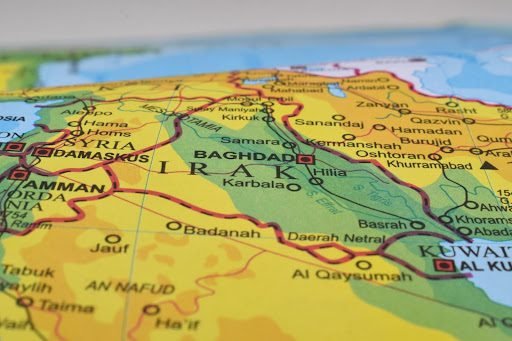
Traveling to Iraq is not on the lists of Back Aquarius – but for those who want to go, it will be an unforgettable journey. This means that you will need to get friendly with Iraqi dinar.
If you don’t deal with Dinars before, don’t worry – this is not as landing as it seems. But understanding the extent in which your money is going, where you exchange it, and the amount of its download will make your journey Smooth, saferAnd Cheaper.
First things: What is the Iraqi dinar?
The Iraqi dinar (IQD) is the official currency of Iraq. At the time of writing this report, the exchange rate is hovering around it 1,300 IQD per US dollarAlthough this can be slightly different depending on where you exchange your money. It is good to verify the current rate with a reliable source such as the implementation of the currency or the central bank to Iraq before traveling.
Sects include both coins and notes, although banknotes are more common. You will find bills ranging from 250 dinars until 50,000 dinars – And yes, it is easy to mix 5000 with 50,000 if you are not careful. Always check what is in your hand.
Where do you get your dinar?

Unlike some countries that you can only withdraw money at the airport or rely on cards, Iraq is largely the monetary economy – Especially for travelers.
Here’s where and how you can get the Iraqi dinar:
- Currency exchange officesI was found in the airports, hotels and major cities such as Baghdad, Erbil and Basra. These usually provide better rates than banks.
- Local banks: Safe, but often slower and more formal. Not always the best option for tourists.
- ATMs: It is increasingly available in big cities, but it is not always reliable, especially outside the Kurdistan region. Some foreign cards may not work.
Professional advice: Bring US dollar bills for exchange – $ 100 is better and widely accepted. Avoid old or damaged notes, as they may be rejected.
How much money you should carry?
One of the most common questions I asked before traveling to Iraq is: “How much money do I really need every day?” The answer truly depends on how to travel, but in general, Iraq is amazingly affordable – especially if you are adhering to local food and transportation.
Here is a look at what things usually cost for travelers:
- Mingle in the streets: 2000-5000 Intelligence rate (1.50 – 4 dollars)
- Medium -range restaurant dinner: 10,000-20,000 IQD ($ 15)
- A joint taxi inside the city: 1,000-3000 IQD (<2 dollars)
- The basic hospitality house/night: 25,000-50,000 IQD ($ 18 – $ 35)
- Water bottle: 500-1,000 IQD (<1 dollar)
- Entry to heritage sites: 5,000 – 10,000 IQD (4 – 8 dollars)
These numbers may turn a little between Baghdad, Basra and Erbil, but it gives a strong idea of the ability of your money. If you wander around 30 – 50 dollars a dayYou will have enough food, housing, and even some foods along the way.
Sustainable gifts and snacks and unexpected
When it comes to shopping, you will be amazed at what extent can 10,000 dinars go. Some ideas:
- Spices, soap and sweets From local bazaars
- Postcards and font prints From cultural centers
- Traditional tea groups Or small crafts for less than 15,000 intelligence rates
- Dates or nuts bags For snacks or gifts
Try to order the price first, and don’t be afraid to get away – sellers often reduce their prices as soon as they see you are serious.
Parish, curvature and other money etiquette
Like a lot of the Middle East, Combating is common in the market and with taxisEspecially in cities such as Baghdad or Mosul. Don’t be shy – just Stay respectful. A smile and a little patience that has a long way.
Transformation (called tipIt is also part of the culture. Although it is not mandatory, small tips (1000-2000 intelligence rates) are estimated in restaurants, drivers or hotel staff. For longer tours, think about turning your guide or driver generously.
Professional advice: Always carry small bills. Fracture of 25,000 notes in the street booth may be difficult.
Cards and digital portfolios
Cards payments are very rareEspecially outside international hotels or high -end restaurants. Even in Erbil or Baghdad, criticism is the king. Most small stores, cafes, and even some hotels do not simply have the infrastructure to treat cards payments.
Mobile phone payments and digital portfolios? Not yet. While some younger local population may use banking applications or QR codes in urban areas, tourists will not find much support for these systems. Adhere to material criticism and do not depend on the cards that work in daily transactions – it is safe to assume that you will need a dinar for almost everything.
Currency and travel safety tips
Dealing with money in a place that works almost completely requires some additional thinking. In Iraq, most of the local residents are used to carrying bills daily, but as a traveler, it is worth taking some simple precautions to keep your money in your safety and the comfort of your mind.
Here is what to take into account:
- Do not flash big bills In public places. Use smaller categories for fast transactions.
- Avoid street money changingAnd especially near the border. Adhere to the reputable exchange offices.
- Use the money belt Or keep the money spread between your wallet, your bag and luggage for safety.
- Maintaining emergency situations In the event that you are not able to reach the dinar or the need to exchange quickly.
These tips may seem essential, but they make a big difference – especially when you are in a crowded market or deal with power outage that expels ATMs. Little planning has a long way to make sure that your journey is working smoothly, and your money remains in its right place.
How the local population deals with their dinars

The locals are familiar with the dinar, and they often use it alongside the dollar in some areas. In the Kurdistan region, prices are sometimes transported in dollars for hotels or tours, but daily life is still working on the dinar. People are accustomed to zeros – and they will also be after a day or two.
In some parts of the country, Even the local population say “thousands” differently Like the saying of “five” to mean “5000 dinars”. The context is important.
Why is it worth learning the dinar
Understanding the Iraqi dinar may seem a small part of your journey, but it opens a richer experience. You will get better deals, communicate more easily with the local population, and avoid unnecessary stress when small daily decisions are offered – such as whether the taxi price is fair.
It is not only about saving money. It is related to travel Smarted.





